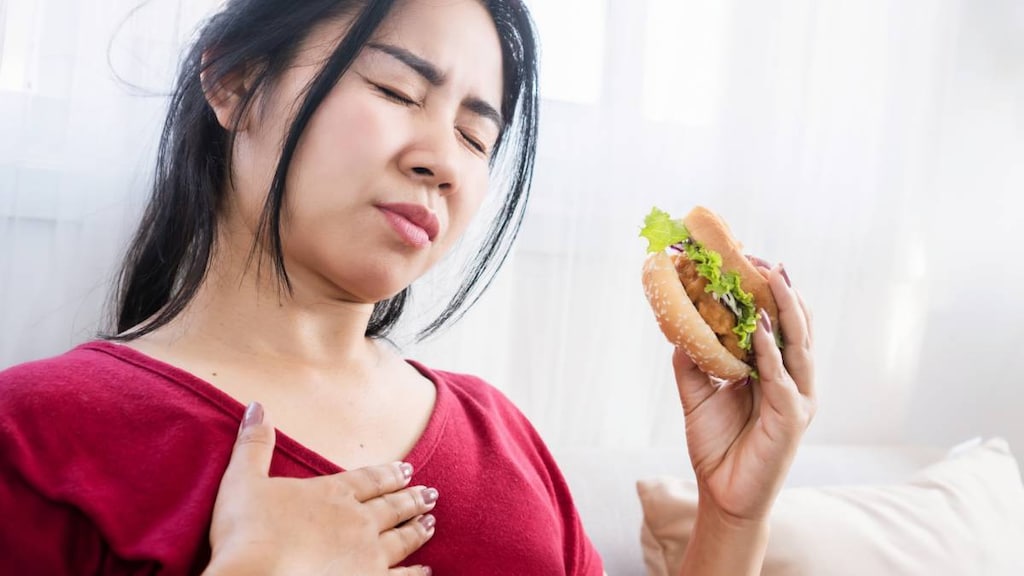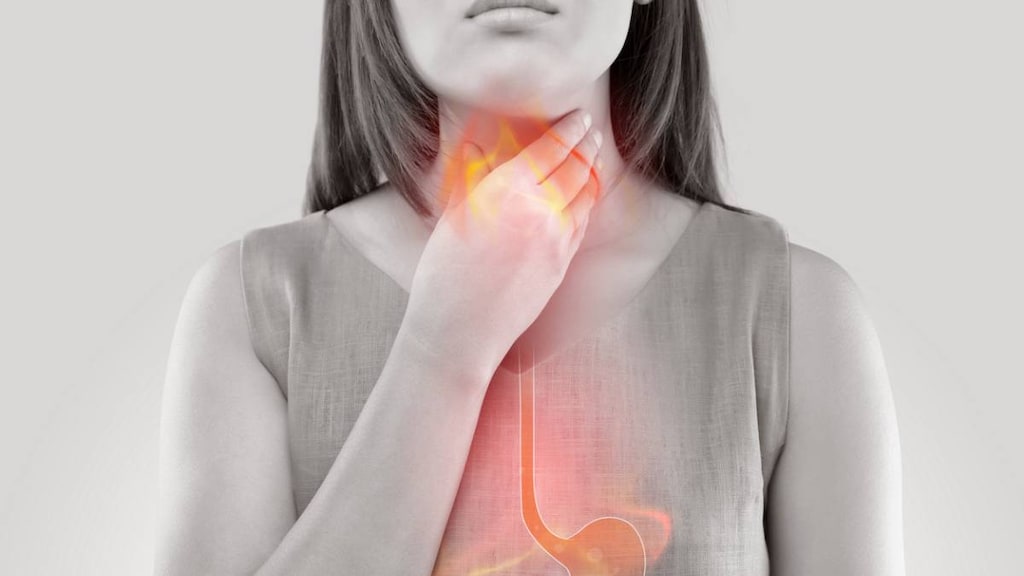8 Foods and drinks to avoid with heartburn

Heartburn is a digestive system problem that causes a burning sensation in your chest. It is also known as acid indigestion or pyrosis.
The burning sensation caused by heartburn is often felt behind your breastbone and may be accompanied by other symptoms such as:
- A sour taste in the back of your throat
- A lump in your throat or feeling that you have food stuck in your throat
- Cough
- Hiccups
- Hoarse voice
Heartburn is commonly caused by acid reflux. Acid reflux occurs when the ring of muscle at the top of your stomach, called your lower esophageal sphincter (LES), relaxes too much, relaxes at the wrong time, becomes weak or doesn’t close fully.
When this happens the contents of your stomach, including gastric acid, digestive enzymes, bile salts and undigested food, can travel back up into the tube that carries food and drink from your throat to your stomach called your esophagus.
Your esophagus doesn’t have the same protection from acid as your stomach, so when your stomach contents push up into your esophagus it gets irritated and you get the burning sensation you feel with heartburn. Other times heartburn is caused by things that you consume that irritate your esophagus on the way down.
Pregnancy and certain medications can bring on heartburn, but it’s also often brought on by consuming certain foods and drinks. Lifestyle changes are often the first step in preventing heartburn.
One change you can make to prevent heartburn is to limit or avoid things in your diet that bring on your symptoms. Everyone is affected differently, so try keeping a journal of what you eat and drink to identify what may be causing your symptoms.
To help you get started we’ve put together a list of 8 common diet culprits that may be causing your heartburn.
8 Foods and drinks that cause heartburn
1. High fat and fried foods
High fat foods, especially fried and greasy foods, may contribute to heartburn by reducing the tone or tension in your LES, which makes it easier for the contents of your stomach to rise back up into your esophagus.
High fat foods can also slow how quickly your stomach empties (gastric emptying), which can lead to an increase in pressure on your LES and heartburn.
Examples of high-fat, fried or greasy foods include:
- Pizza
- French fries
- Fried chicken
- Deep fried onion rings
- Fatty cuts of meat or fish
- Donuts
- Hotdogs
- Full-fat dairy - ice cream, whole milk, sour cream and cream
2. Spicy food
Spicy foods are often associated with heartburn, especially in people that do not consume them frequently. Spicy foods are thought to cause heartburn by directly irritating the lining of the esophagus. Chili, for example, is a key ingredient in many spicy foods and it contains capsaicin, which can irritate the lining of your esophagus and can worsen symptoms of heartburn. Capsaicin also delays gastric emptying.
Examples of spicy food include:
- Hot salsa
- Hot spicy stews and curries
- Sichuan Hot-Pot
- Jerk chicken
- Food that contains chilies or chili paste
- Jalapeno poppers
3. Alcohol
Drinking alcohol can also cause heartburn. Alcohol causes your LES to relax, increases the amount of stomach acid you produce, slows down how quickly your esophagus moves food from your throat to your stomach and delays gastric emptying.
Several studies have shown that people who drink alcohol at least three to five times a week are at increased risk of gastrointestinal reflux disease (GERD). Heartburn is one of the symptoms of GERD.
Examples of alcoholic drinks include
- Beer
- Wine
- Cocktails
- Spirits, for example, vodka, gin, or rum
4. Soda and other carbonated beverages
Soda and other carbonated beverages can trigger heartburn.
Like with alcohol, these drinks can cause your LES to relax slightly. They can also cause your stomach to swell or distend and lead to transient LES relaxations (TLESRs), which is when the ring of muscle around the top of your stomach relaxes spontaneously without you swallowing. This helps to let gas escape, but it can also cause heartburn.
Carbonated drinks and soda may also cause a short-term drop in the pH of your esophagus, meaning that the area becomes more acidic.
Examples of these beverages include:
- Soda
- Carbonated water, (also known as fizzy water or sparkling water.)
- Energy drinks
- Sparkling wine
- Tonic water
5. Acidic fruits, vegetables and juices
Acidic fruits and vegetables, and their juices can also aggravate heartburn symptoms. It’s thought that their acidity can irritate the lining of your esophagus, making it more sensitive.
Examples of acids foods and juices to avoid include:
- Citrus fruits, including orange and grapefruits, and their juice
- Tomatoes, including tomato juice, and tomato-based foods such as tomato preserves and ketchup
- Pineapple
- Garlic
- Onions
6. Caffeine
Drinking caffeinated drinks such as coffee and tea may also cause heartburn. Too much caffeine can relax your LES.
Examples of drinks containing caffeine include:
- Coffee
- Tea
- Some sports or energy drinks
If you think caffeinated drinks are causing your heartburn, check out our tips for breaking your coffee habit.
7. Chocolate
Chocolate contains cocoa and caffeine and it might also be causing your heartburn symptoms. Like many other things, chocolate can cause your LES to relax, increasing the amount of time your esophagus is exposed to the acidic contents of your stomach.
8. Peppermint
Peppermint is sometimes used to soothe an upset stomach, but in a small number of people it can also make heartburn worse by relaxing your LES.
Examples of foods and drinks that contain peppermint include:
- Sweets or candy containing peppermint
- Peppermint syrup
- Peppermint chocolate
- Peppermint tea
Bottom line
Heartburn often occurs after a meal or at night. While there isn't a lot of research to confirm which dietary changes are likely to help, many people find that limiting or avoiding certain foods and drinks helps to prevent their heartburn symptoms.
Other tips you can try to help manage your heartburn symptoms include:
- Avoiding large meals. Eat small amounts of food and chew your food slowly
- Eating at least three hours before bed
- Taking a medication that helps heartburn
- Avoiding tight clothing around your stomach
- Trying a healthy diet, such as the Mediterranean diet
The occasional bout of heartburn is not generally cause for concern, but heartburn can sometimes be a symptom of other health conditions like GERD. Talk to your doctor if you experience heartburn more than twice a week or your symptoms don’t go away with lifestyle changes and over-the-counter (OTC) medications. This may be a sign you have a more serious medication condition.
If your chest pain is severe or is accompanied by other symptoms such as arm pain, shortness of breath or cold sweats, seek medical attention straight away. These may be signs of a heart attack.
Article references
- MedlinePlus. Heartburn. Available at: https://medlineplus.gov/heartburn.html. [Accessed May 24, 2022].
- Southern Cross. Heartburn (acid reflux)- causes, treatment. Reviewed Feburary 2018. Available at: https://www.southerncross.co.nz/group/medical-library/heartburn-acid-reflux-causes-treatment. [Accessed May 24, 2022].
- Pan J, Cen L, Chen W, Yu C, Li Y, Shen Z. Alcohol Consumption and the Risk of Gastroesophageal Reflux Disease: A Systematic Review and Meta-analysis. Alcohol Alcohol. 2019;54(1):62-69. doi:10.1093/alcalc/agy063.
- Gonlachanvit S. Are rice and spicy diet good for functional gastrointestinal disorders?. J Neurogastroenterol Motil. 2010;16(2):131-138. doi:10.5056/jnm.2010.16.2.131.
- Newberry C, Lynch K. The role of diet in the development and management of gastroesophageal reflux disease: why we feel the burn. J Thorac Dis. 2019;11(Suppl 12):S1594-S1601. doi:10.21037/jtd.2019.06.42.
- Sethi S, Richter JE. Diet and gastroesophageal reflux disease: role in pathogenesis and management. Curr Opin Gastroenterol. 2017;33(2):107-111. doi:10.1097/MOG.0000000000000337.
- Fox, Mark, Heinrich, Henriette. Advanced Nutrition and Dietetics in Gastroenteroly. Gastro-oesophageal reflux disease and nutrition. pp. 105-110. Published 27 June, 2014. doi.org/10.1002/9781118872796.ch3.3.
- Murphy DW, Castell DO. Chocolate and heartburn: evidence of increased esophageal acid exposure after chocolate ingestion. Am J Gastroenterol. 1988;83(6):633-636. https://pubmed.ncbi.nlm.nih.gov/3376917/.
- Jarosz M, Taraszewska A. Risk factors for gastroesophageal reflux disease: the role of diet. Prz Gastroenterol. 2014;9(5):297-301. doi:10.5114/pg.2014.46166.

